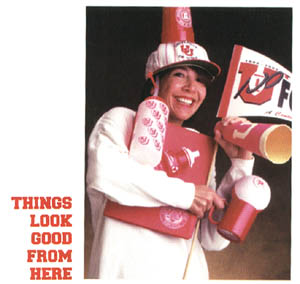by Anne Palmer Donohoe
A teaching assistant from Turkey with a thick accent spent several days discussing "moynter pollzy" with my undergraduate macroeconomics section before anyone discovered monetary policy was on his mind. Ghokhan Kapoglu is one of the only college teachers I had whose name comes readily to mind. Such is the indelible nature of negative experiences.
At 18, the material was foreign enough without the teaching assistant’s diction trouble. So, it was gratifying recently to learn that Alumni Association board members’ insistence that efforts to address problems with unintelligible international TA’s continue. Two University Teaching Assistants with expertise in applied linguistics are working with the Association’s Advocacy Committee to eliminate language barriers to learning.
It is rewarding that alumni concerns have registered. More importantly, it shows that improved testing, training, and monitoring of teaching assistants from outside the U.S. is a priority at the U. While serving on the Alumni Board, Martha Stockham BSN’87 recommended implementing a "hotline" so unsuspecting students who encounter teaching assistants lacking adequate language or teaching skills would be assured some recourse. Like her peers who serve on the Board and give counsel throughout campus, Stockham is a symbol of devotion to her University.
Advocating improved student service is just one aspect of alumni involvement in the life of the University of Utah. In recognizing that problems do exist at this university, graduates acknowledge how much the institution is a part of the real world. These are volunteers who recognize, as US News and World Report did, that the University of Utah is one of the great educational institutions in the country &emdash; and getting better all the time. Incidentally, US News reported that the U has advanced from the third to the second tier among this year’s top-ranked national universities. Progress is all around; reporting on it is my privilege.
I’ve been fortunate to come to the position as editor from the Alumni Association staff, where I assisted in management of this magazine and worked in alumni legislative and community relations. Before that, I covered research advancements at the University of Utah for The Salt Lake Tribune.
From my vantage point at the Alumni House I gained perspective on the depth of loyalty that comes from spending one’s formative years at a place that teaches not answers, but how to frame the questions. Among the graduates of the University of Utah are not only our most distinguished leaders, but people who are willing to take on the sources of the greatest challenges the campus and community face. The caliber and generosity of individuals associated with Utah have combined to give me many great impressions of this University.
In this, my first issue as editor, I’m pleased to point out ways that Utah alumni help bring the University grace and recognition. Not the least of these is helping to raise more than half the designated funds for the University’s Sesquicentennial Campaign. But they also demonstrate in passionate ways why an ongoing relationship with their alma mater matters by:
*participating in selection of the next president of the University of Utah, an honor bestowed on Alumni Association President Lorna H. Matheson ex'56. In fact, 15 of the 22 search committee members are Utah alumni.
*collecting 292,000 pounds of food for Utah’s hungry, which Brenda Yamagata BS'84 and her Community Service Committee did by rallying campus and community resources. Utah Food Drive '96 was one of the most successful service events ever sponsored by the Association.
*instilling pride, by recalling the challenges the founders of this great University faced, as observed at Founders’ Day ‘97 through the recognition of distinguished and honorary alumni whose achievements exemplify the value of truly educated people.
Finally, credit is widely deserved for constituents who recognized the value in supporting three statewide measures critical to public and higher education last November. These were passed, along with a County option that will expand outreach by four University of Utah community resources: the Utah Museums of Natural History and Fine Arts; Pioneer Theatre Company; and Red Butte Garden and Arboretum. Educating voters is another critical way alumni who recognize that their college experience provided a foundation or an inspiration for what they do with their lives provide the University sustenance. I look forward to exploring with alumni, and all of Continuum’s readers, the University of Utah experience.
